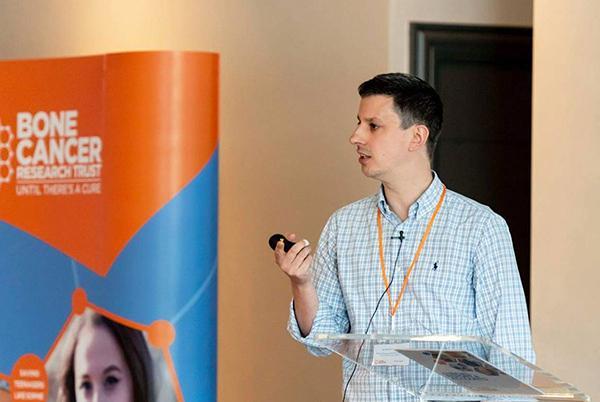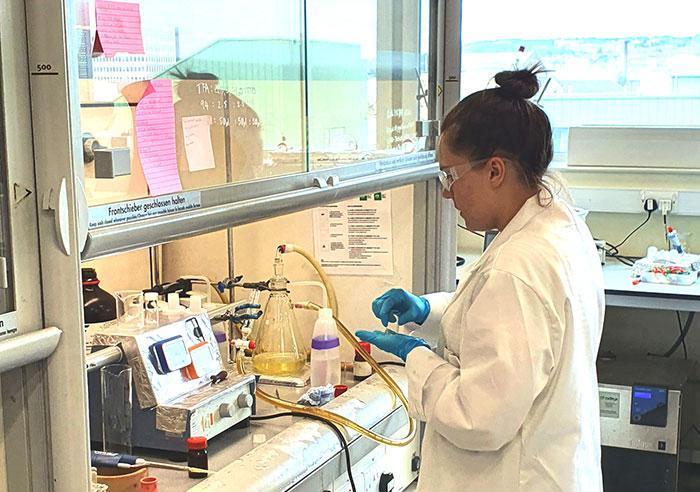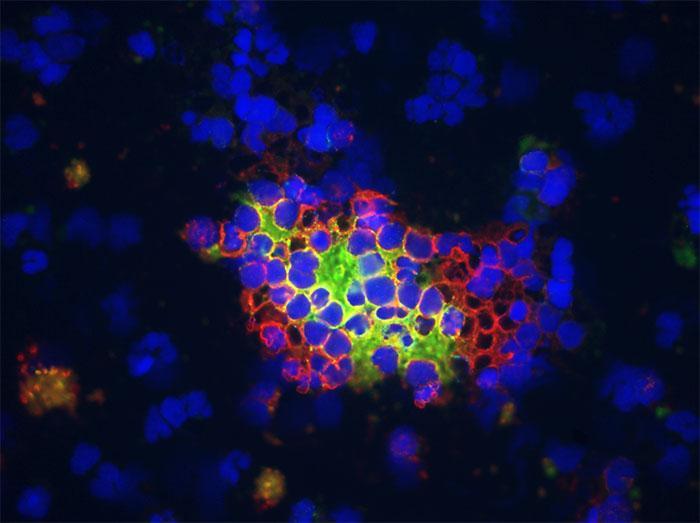Cancer discoveries updated
We caught up with Rob Falconer, Professor of Medicinal Chemistry, to get an update on the work to develop anti-cancer drug therapies at Incanthera and the Institute of Cancer Therapeutics (ICT) that has taken place since our last article.
The breakthrough technique that led to the formation of Incanthera Plc, where toxic molecules were targeted at the tumour sparing the body and the normal tissues, has been developed into other areas in the ICT, and Prof Falconer and colleagues Prof Paul Loadman and Dr Steve Shnyder have been awarded a grant from the Bone Cancer Research Trust to investigate new ways of treating osteosarcoma:
"We’re looking at safely delivering methotrexate (a drug that’s been around a long time) to bone cancer - we've got to the point where we've got a molecule that is activated in tumour tissue in a lab setting and is relatively stable in normal tissue. The next stage is an animal model to assess how well it's getting to the tumour and how much drug is being released. It’s exciting research that will be carried out by the same student (Hannah Spencer) who did the initial PhD project, with £250K funding for another three years to optimise that molecule and progress it on its journey hopefully towards patient trials."

Prof Rob Falconer presenting his research
There was also a funding award from Worldwide Cancer Research for the development of treatments for neuroblastoma, a rare type of childhood cancer that develops from nerve cells left behind from a baby's early development. The £194k research project again involves modifying an existing drug, in this case one that was previously shelved in clinical trials due to being toxic to the heart, so that it is activated only in the tumour cells. The work will look at combinations of the modified drug with current neuroblastoma therapies. This work also draws on the expertise of Prof Sherif El-Khamisy (Director of the ICT) in DNA repair. There’s lots of other exciting work going on at the ICT in the area of targeted therapeutics:

PhD student Hannah Spencer in an ICT lab
We're working on several of what we call targeted ‘prodrug’ approaches. Prof Klaus Pors and his team are researching another enzyme family, cytochromes P-450 that modify molecules to make them active in tumours in an effective way. That natural product of focus is part the duocarmycin family. We’re also about to file a patent for another type of duocarmycin with potential for use in antibody-drug conjugates that came out of recent work on breast cancer.
"Within the ICT there’s also work on targeting unique features within solid tumours; in larger tumours there are hypoxic areas (those that are far away from the blood vessels which become adapted to very low levels of oxygen and nutrients) - this makes it difficult to get drugs to impact them. Klaus (Pors) and his team are developing another type of prodrug which is specifically activated in those types of low oxygen conditions and looking at a group of enzymes which operate in that environment which can transform parts of the chemical structure in the tumour. Other projects are looking at prodrugs targeted to specific proteins found in tumours called integrins (Dr Helen Sheldrake), and in designing better prodrugs of temozolomide, which is one of the only drugs available for the treatment of deadly brain tumours (Dr Richard Wheelhouse)."
Professor Falconer joined the ICT in 2005, and attributes its successes to the range of expertise and facilities at the centre, including medicinal chemists, pharmacologists, in vivo and molecular biologists, and the ability to collaborate, interact and react to data as a team under one roof. The academic setup provides a state-of-the-art learning environment for PhD students, but also research opportunities in a different space to that of the big pharmaceutical companies, and this is something he is passionate about:

Neuroblastoma cancer cells
Rare and childhood cancers such as neuroblastoma and osteosarcoma are not well served by most up-to-date treatments, they are often left behind. The drug companies are frequently not interested because the low numbers of patients make them not commercially viable. So I feel a responsibility that academia is where we can make a difference in that space; it really is important, and one of the key strengths of the ICT.
Find out more about the Institute of Cancer Therapeutics on their webpages.
In the REF 2021 assessment, over 80% of outputs in Allied Health Professions, Dentistry, Nursing and Pharmacy were rated as Internationally Excellent or World Leading. You can also see more details of our REF2021 results, including a selection of videos and case studies.
